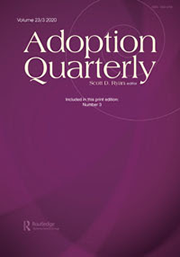 Congratulations to Assistant Professor of Psychology Kristina Howansky who was recently published in the journal Teaching of Psychology!
Congratulations to Assistant Professor of Psychology Kristina Howansky who was recently published in the journal Teaching of Psychology!
 Congratulations to Assistant Professor of Psychology Kristina Howansky who was recently published in the journal Teaching of Psychology!
Congratulations to Assistant Professor of Psychology Kristina Howansky who was recently published in the journal Teaching of Psychology!
 Congratulations to Visiting Assistant Professor Cjersti Jensen and collaborators who recently published an article titled “Examination of ethnic racial identity exploration and commitment in emerging adults: Group comparisons and specific features of multiracial identity” in Journal of American College Health!
Congratulations to Visiting Assistant Professor Cjersti Jensen and collaborators who recently published an article titled “Examination of ethnic racial identity exploration and commitment in emerging adults: Group comparisons and specific features of multiracial identity” in Journal of American College Health!To better understand differences in Monoracial White, Monoracial Minoritized, and Multiracial college students, 888 emerging adults were surveyed. Results indicated that Multiracial participants were significantly different than the other two groups in ethnic identity exploration and experienced discrimination (with Monoracial White participants showing the lowest levels, Monoracial Minoritized participants showing the highest). Multiracial participants did not differ significantly in ethnic identity commitment from Monoracial White participants, but both groups were significantly lower in commitment than Monoracial Minoritized participants. Because Multiracial college students are poorly represented in the literature, Jensen and her collaborators also explored some variables specific to having multiple racial identities. Multiracial participants’ ethnic identity commitment, a variable related to positive psychosocial outcomes in previous research, showed a significant positive relationship with both ethnic identity exploration and a negative relationship with conflict between identities. This research highlights the differences between Monoracial and Multiracial people, and makes a strong case for people working with Multiracial college students to consider their unique challenges and experiences.
 Congratulations to Assistant Professor of Psychology Kristina Howansky and collaborators who recently published “Identity safety cues predict instructor impressions, belonging, and absences in the psychology classroom” in the journal Teaching of Psychology!
Congratulations to Assistant Professor of Psychology Kristina Howansky and collaborators who recently published “Identity safety cues predict instructor impressions, belonging, and absences in the psychology classroom” in the journal Teaching of Psychology!
Howansky, K., Maimon, M., & Sanchez, D. (2021). Identity safety cues predict instructor impressions, belonging, and absences in the psychology classroom. Teaching of Psychology, https://doi.org/10.1177/0098628321990362
This work aimed to explore some of the possible benefits of identity safety cues – signals to let students’ know diverse identities are valued in their classroom – in the higher-ed classroom. Researchers found that identify safety cues were associated with more positive impressions of students’ professor, a higher sense of belonging in the class, and even fewer absences. Although the safety cues were aimed at specific populations, they were associated with positive outcomes across student identities, even those not specifically targeted by the cues. Provided in the article are concrete examples and small steps faculty can make to signal their values of inclusion to students.
You can read the abstract here.
The acknowledgements section of the paper includes a shoutout to psychology department members Assistant Professor Gili Freedman, Assistant Professor Ayse Ikizler, and Associate Professor Scott Mirabile for their feedback on the manuscript. It also gives thanks to psychology majors Gabrielle Backus, Jannah Mawuli, and India Oates.
 Congratulations to Dr. Laraine Glidden who served as the editor for a new APA handbook!
Congratulations to Dr. Laraine Glidden who served as the editor for a new APA handbook!
Glidden, L. M. (Ed.). (2021). American Psychological Association Handbook of Intellectual and Developmental Disabilities. Washington, D.C.: American Association on Intellectual and Developmental Disabilities.
Consisting of 2 volumes, this 2021 Handbook contains 38 chapters and was in process from its inception in late 2016 to its publication at the very beginning of 2021. Distinguished Professor Emerita Laraine Masters Glidden, faculty member in psychology and human development from 1976 to her retirement in 2012, oversaw its development. She selected three associate editors, and together they developed the table of contents and invited authors who were experts in their respective subfields of developmental disabilities.
Read the full press release at https://inside.smcm.edu/news/2021/01/distinguished-professor-emerita-laraine-masters-glidden-editor-chief-two-volume-apa
Read the handbook overview and table of contents here.
Glidden and her decades-long parenting research are featured in the Fall 2020 edition of The Mulberry Tree. The article that starts on page 13 mentions Glidden’s work on the Handbook and numerous other publications and presentations. It also highlights a number of psychology program alumni who collaborated with Glidden on some of those works.
 Assistant Professor of Psychology Kristina Howansky was interviewed on the AskPsychSessions podcast about being an early career academic during the pandemic. Posing the question, “How can I employ radical empathy to teach during a pandemic,” they discussed using safety cues to increase belongingness and how radical empathy can make classes go more smoothly. The interview ends with a discussion on Howansky’s new course on the psychology of sharks.
Assistant Professor of Psychology Kristina Howansky was interviewed on the AskPsychSessions podcast about being an early career academic during the pandemic. Posing the question, “How can I employ radical empathy to teach during a pandemic,” they discussed using safety cues to increase belongingness and how radical empathy can make classes go more smoothly. The interview ends with a discussion on Howansky’s new course on the psychology of sharks.
The podcast can be found here: https://www.stitcher.com/s?eid=80934013&refid=asa
 Congratulations to Visiting Associate Professor of Psychology Brian Sharpless who recently published an article in the Journal of Sleep Research with two colleagues from Charles University and the National Institute of Mental Health (NUDZ) in the Czech Republic! The article, “Could Sleep Paralysis be Pleasant?” was a quantitative study of the prevalence and associated features of sleep paralysis episodes.
Congratulations to Visiting Associate Professor of Psychology Brian Sharpless who recently published an article in the Journal of Sleep Research with two colleagues from Charles University and the National Institute of Mental Health (NUDZ) in the Czech Republic! The article, “Could Sleep Paralysis be Pleasant?” was a quantitative study of the prevalence and associated features of sleep paralysis episodes.
 Congratulations to Professor of Psychology Libby Nutt Williams and alums Meg Marcelli ‘17, Ben Ertman ‘18, and Kelly Culotta ‘18 who recently published an article in the journal Adoption Quarterly!
Congratulations to Professor of Psychology Libby Nutt Williams and alums Meg Marcelli ‘17, Ben Ertman ‘18, and Kelly Culotta ‘18 who recently published an article in the journal Adoption Quarterly!
Marcelli, M., Williams, E. N., Culotta, K. & Ertman, B. (2020). The Impact of Racial-Ethnic Socialization Practices on International Transracial Adoptee Identity Development, Adoption Quarterly, DOI: 10.1080/10926755.2020.1833393
The article is based on Marcelli’s SMP which was a qualitative study that explored adoptees’ perspectives on their parents’ socialization strategies and the effect of those practices on their sense of identity and ability to manage future challenges, such as racial discrimination. Marcelli was scheduled to present the research at the Annual Meeting of the National Association of Social Workers Conference in June 2020, but the conference was unfortunately cancelled due to COVID-19.
 Congratulations to Dr. Gili Freedman!
Congratulations to Dr. Gili Freedman!
Assistant Professor of Psychology Gili Freedman and colleague Dr. Jennifer Beer (University of Texas at Austin) recently received a collaborative, three-year grant from the National Science Foundation for a total of $465,222 ($75,102 of which will go to SMCM). In the project titled “Collaborative Research: Lessening the Blow of Social Rejection,” Freedman and Beer will be investigating the language of social rejection and how power and concern for one’s reputation shape the way that individuals reject others. A central aim of the project is to develop empirically supported training that teaches individuals how to be less hurtful when they engage in social rejection. Starting this fall, Freedman will be working with SMCM collaborative research students on the first stages of the grant.
Read the award abstract on NSF’s website.

Congratulations to Dr. Brian A. Sharpless, Visiting Associate Professor of Psychology, who recently published an article in the journal Sleep Medicine with several colleagues from the US and the UK. The article, “Exploding Head Syndrome: Clinical Features, Theories about Etiology, and Prevention Strategies in a Large International Sample”, was based on data from over 6,000 participants. It was carried out through the British Broadcasting Corporation’s Science Focus Magazine.
Exploding head syndrome (EHS) is a sleep disorder (i.e., parasomnia) characterized by the perception of loud noises or a sense of explosion in the head during sleep transitions. Though first identified in 1876, it has received relatively little scientific attention and no well-established treatment options are yet available for sufferers.
Results of this study indicated that those with EHS had poorer and shorter sleep than those without EHS. Not surprisingly, episodes of EHS were associated with clinically significant levels of fear, but only 25% of experienced significant distress as a result of episodes whereas only 10% reported significant life interference. The majority of sufferers believed EHS to be a natural, brain-based phenomenon, but 2.3% blamed electronic equipment and 2.8% believed that was due to supernatural causes. Finally, five effective prevention strategies were identified from the first-hand reports of sufferers. Several of these were consistent with existing treatment approaches for insomnia and anxiety and may prove useful for developing a novel treatment for chronic EHS.
On July 15, 2020, Sharpless was interviewed by Newsweek in regards to the study.